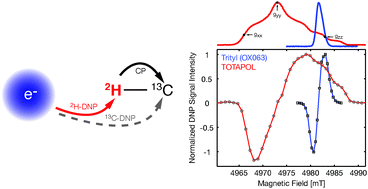2H-DNP-enhanced 2H–13C solid-state NMRcorrelation spectroscopy
Abstract
Perdeuteration of biological

- This article is part of the themed collection: High field dynamic nuclear polarization – The renaissance
* Corresponding authors
a
Francis Bitter Magnet Laboratory and Department of Chemistry, Cambridge, USA
E-mail:
rgg@mit.edu
Fax: +1 (617) 253-5404
Tel: +1 (617) 253-5597
Perdeuteration of biological

 Please wait while we load your content...
Something went wrong. Try again?
Please wait while we load your content...
Something went wrong. Try again?
T. Maly, L. B. Andreas, A. A. Smith and R. G. Griffin, Phys. Chem. Chem. Phys., 2010, 12, 5872 DOI: 10.1039/C003705B
To request permission to reproduce material from this article, please go to the Copyright Clearance Center request page.
If you are an author contributing to an RSC publication, you do not need to request permission provided correct acknowledgement is given.
If you are the author of this article, you do not need to request permission to reproduce figures and diagrams provided correct acknowledgement is given. If you want to reproduce the whole article in a third-party publication (excluding your thesis/dissertation for which permission is not required) please go to the Copyright Clearance Center request page.
Read more about how to correctly acknowledge RSC content.
 Fetching data from CrossRef.
Fetching data from CrossRef.
This may take some time to load.
Loading related content
